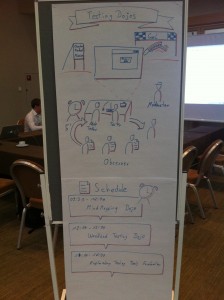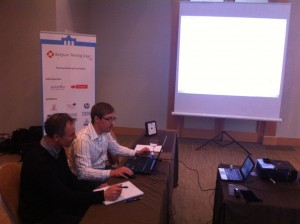Last week I crossed the term “best practices” quite often. So I decided to share my thoughts on the term, and offer alternatives.
Continue reading Best practices for “Best practices”ObjektForum Nord on Akzeptanztests
Tonight I held a presentation on acceptance test-driven development. The slides to my presentation are now uploaded to slideshare. They’re in German, so don’t try to fix your monitor if you can’t read a thing.
Akzeptanztests from Markus Gärtner
Some of the online resources and books I mentioned:
- Matt Heusser’s reference to Van Halen and brown M&M’s
- Bridging the Communication Gap from Gojko Adzic
- Simulating your way out of regression testing blog entry from Gojko Adzic
- Specification by Example from Gojko Adzic
One of the themes I discussed later was related to Gojko’s blog entry on Simulating your way out of regression testing. When do we throw away an acceptance test and how to get rid of too much ballast? I would love to explore this question in more depth in the next few months. I sense a blog entry coming up here, so stay tuned about this.
It was a pleasant evening. Thank you all for attending.
“We don’t need no education…”
“… we don’t need no thought control.” Today I heard this song during a sports course from CD, and was reminded about a piece I read last week, and my reaction on it. Before I start let me mention that I don’t intend to offend you if you have put work into the ISTQB (or any other test certification) syllabus, or if you are teaching it. I truly believe that your intentions were quite reasonable at the time when you started to work on it. That said, if your kids are watching over your should right now, send them to bed, or playing while you read the following.
Continue reading “We don’t need no education…”Looking back on six months of a new job
It’s been a while sicne I left my previous employer in order to seek greener pastures, and get in the road towards the consulting business with it-agile GmbH. Since my trial period (we got six months here in Germany) ended on Tuesday, let me take a look back on the past half year.
Continue reading Looking back on six months of a new jobThe Inbox-Zero Fallacy
On my flight to the Belgium Testing Days I noticed a pattern regarding answering and handling emails. I think there is a vicious cycle between two groups of people dealing with emails.
Thus far, I observed two kinds of behaviors when answering emails. First there are people like the one sitting in front of my row on the plane to Brussels. They take their laptop with them, open them while on the plane, move email from here to there, putting them in different folders, organizing them in thoughtful ways, in order to have everything in its place.
Then there are the guys who are like me. When they get an email, and recognize it, they work at it straight away, hitting the reply button, writing back a quick statement, sending the mail back. Or, if there is no further use, they read it, and forget about it. Sometimes I wonder whether my motivation to directly answer an email is to get the ball back to the person who sent me something – sometimes, but not often.
I don’t have problems with too many unread emails. Though, consider what happens, when I finally get a reply from one of the “move mails in folders”. I open it, read it, hit reply, write whatever comes to mind, send it back. Now, that guy might be trying to reach an Inbox-Zero state quickly working back the 20 mails from me. As he does this, he gets replies in between – often times faster than he can answer. Maybe in the end he gives up.
Do you see the problem? Well, I don’t have a problem from my perspective. But while watching the guy moving mails around on the plane, not sure what to do about them, re-opening the mail and the attachment, that guy looked poor to me. In the end I was considering whether he had a conversation with someone like me.
Of course, this is a self-reinforcing system as you might have noticed by now. But I don’t have the problem, besides I got some longer waiting times from time to time. But who should solve the problem? Well, I think I can contribute to the solution by not answering every email as quickly as I can, and leaving the other people around me some room to breathe, and eventually end up with an Inbox of zero – but let’s see.
Belgium Testing Days: Testing Dojos Report
This is my final report from the Testing Dojos at the Belgium Testing Days. Over all there have been roughly ten different persons attended in one mission or the other. We ran about eight missions in two days. On the first day we started with Google Refine, in the morning on the second day we had a look on Mind Mapping tools, at noon tackled a planning wizard, and finished in the afternoon with some exploratory note-taking tools. I learned a lot, and I hope so did the participants.


Belgium Testing Days: Looking into the future
While leading the Testing Dojos at the Belgium Testing Days unfortunately I was able to attend just few presentations. One of them were the Lightning Talks on Tuesday evening by Dorothy Graham, Stuart Reid, Hans Schaefer, Lisa Crispin, Johanna Rothman, Julian Harty and Lloyd Roden on Looking into the future.
Continue reading Belgium Testing Days: Looking into the futureA week with Kent Beck
In November I had the opportunity to stay a whole week with Kent Beck. it-agile GmbH invited him for two courses – Responsive Design and Advanced TDD – and one workshop to Hamburg, Germany, and I took both courses and the workshop. Today I was contacted by Johannes Link who was surprised not to find a write-up of this week on my blog. It turns out somewhere during the past year I have turned into a reporter. So, here is my summary from what I could get from my notes. Initially I planned to write it via email to Johannes, but then I though why not share those comments on my blog. Maybe others are looking forward to it.
Continue reading A week with Kent BeckKanban in German
Today I attended a presentation for the German edition of the Kanban book by David Andersen at the Lehmann’s book store in Hamburg. My colleagues from it-agile, Henning Wolf and Arne Roock translated the English book to German. They gave an introduction to Kanban, and answered some questions from the roughly 100 attendees.

Specification by Example – The Big Win
On February 2nd 2011 I was invited by Gojko Adzic to a seminar on Winning Big with Specification by Example. It was a half day seminar that took place in London. This is what I took away from the course.
Continue reading Specification by Example – The Big Win